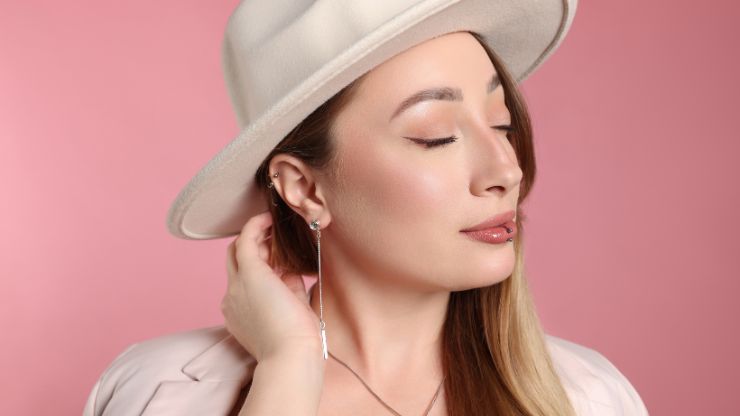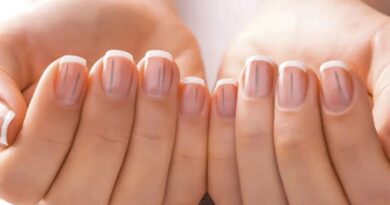Getting a conch piercing is an exciting venture into the world of body art, but understanding the healing process is paramount. The journey of how long it takes for a conch piercing to heal is a unique experience for each individual. From the initial piercing procedure to the final stages of complete healing, navigating this process requires patience and proper care. In this brief exploration, we will unravel the intricacies of conch piercing healing, touching on the factors influencing the timeline, the stages involved, and key considerations for a successful and comfortable recovery.
Join us as we delve into the world of conch piercings, demystifying the time it takes for these stylish ear adornments to become a seamless part of your personal expression.
What is a Conch Piercing?
A conch piercing is positioned in the middle of the ear, where there is the most room, and because of this, it is one of the most adjustable ear piercings available. When requesting this form of piercing, keep in mind that you can obtain an inner or outer conch piercing depending on the shape of your ear. When an inner conch piercing is performed, a hole is made directly through the center of the ear to accommodate a stud. Then there’s the outer conch piercing, which permits a ring to be worn around the cartilage of the ear.
Read Also: How long should you wait to shave after exfoliating
How much does the conch piercing hurt?

The conch piercing is no more painful than any other cartilage piercing. Cartilage piercings and conch piercings are both roughly midway on the discomfort scale. The procedure will hurt more than a lobe piercing, but it shouldn’t be too painful for most people.
A 14G needle is often used to penetrate the conch. Of course, you may go more drastic, but you should use a dermal punch rather than a needle if you do. The dermal punch provides a bigger gauge, but it removes a part of the cartilage rather than just piercing the skin, making it a more invasive technique.
Dermal punch piercings also don’t heal on their own, and several states forbid using dermal punches for piercing, so they aren’t recommended.
Quick Link: can you dye wet hair with permanent hair dye
What is the healing time for a conch piercing?
The conch piercing will heal similarly to any other cartilage piercing. However, cartilage heals more slowly than other fleshier places and varies widely from person to person. The conch will take anywhere from three months to a year to fully recover, so see a piercer before halting aftercare treatments.
Although it takes somewhat longer than a standard earlobe piercing, if you take proper care of it during the healing period, you will be left with a much more unique appearance.
Read Also this: how to cut a pixie haircut at home
How to make Conch Piercing heal faster?

Conch piercings take longer to heal since the cartilages are thinner than fleshy places like lobes or tongues. Conch piercings heal in roughly six months to a year on average. Although it takes longer to heal than an earlobe piercing, the benefits are well worth the wait. You will appear particularly attractive if you take good care of yourself during this time. Here are some conch piercing aftercare suggestions to help you heal faster.
- Choose the right ear jewelry.
The sort of ear jewelry you wear might affect how long it takes for you to recuperate. While you may like wearing a ring in your conch, rings take longer to heal. It is usual for hair strands or garments to become entangled in the ring while bathing, dressing, or undressing, slowing the healing process. As a result, rings can be postponed until the pricing is healed. Instead, put on a beautiful stud.
- Prevent infection by bacteria
By preventing others from touching your conch piercing, you can minimize the risk of developing a bacterial infection. While touching the piercings, you should also wear gloves or clean your hands. In addition, avoid hot tubs, swimming pools, and other communal water sources for the first few weeks after the piercings.
- Be careful not to thin your blood.
This is one of the most crucial conch piercing aftercare suggestions. During the first several weeks of healing, new piercings are prone to intermittent bleeding. As a result, it’s critical to avoid blood thinners like alcohol, aspirin, and excessive caffeine use for the first several weeks.
- Don’t try to replace the jewelry.
We understand your want to experiment with trendy jewelry on your new piercing; nevertheless, remember that cartilages are not the same as earlobes. You may change the jewelry after 8-10 weeks with earlobe piercings, but you must wait at least 6 to 12 months with conch piercings.
- Apply body piercing spray
Conch piercings should be cleaned every day to speed up the healing process. In addition, we recommend H2Ocean Sea Salt Body Piercing Spray Vegan Organic 6oz. This product is 100% natural, vegan, non-GMO, and preservative-free. Thus, it is possible to remove dried lymph secretions that may clog the piercing.
Conclusion
In conclusion, the journey of a conch piercing is unique for each individual. Understanding the various phases of healing, common challenges, and the importance of aftercare contributes to a positive experience. Remember, patience is key, and celebrating the successful healing of your conch piercing is a moment worth cherishing.
FAQ
Yes, it’s entirely normal for a conch piercing to be tender in the first few weeks. This is part of the natural healing process.
You can consider changing the jewelry for the first time during the intermediate healing phase, usually between weeks 5 and 12.
If you suspect an infection, it’s crucial to consult with your piercer or a healthcare professional promptly. Avoid self-diagnosis.
It’s advisable to avoid swimming in pools, hot tubs, or natural bodies of water during the initial healing phase to prevent infection.







